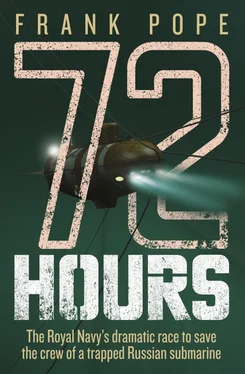Worried about power fluctuations caused by the welder, Gold had not yet allowed Scorpio’s control container to be connected to the ship’s power supply. He needed a constant supply of anywhere between 380 and 460 volts, but sudden peaks and troughs could cause havoc. Now, with everything in place and the welder’s torch just reinforcing the spot welds holding down the control container and the umbilical cable winch, Gold asked for a pause in the welding work, took a deep breath and engaged the main circuit breaker, linking Scorpio’s electrical systems to the Russian vessel’s for the first time. Several gauges in the control van sprang into life, but the needles settled on 360 volts. Gold paused, took a breath, then double checked the main connections. Still the three phase power coming to him was short. Although Scorpio was supposed to function at anything from 380 volts, he’d never made do with less than 400 before.
Gold called out to Holloway to alert the ship’s electrician. Ten minutes later, Holloway returned, having asked the Master to shut down all non-essential electrical power to the ship. All electrical capacity available on the ship was now being routed towards Scorpio’s control cabin, he said. Gold flicked the switch again and the voltage needle jumped up and settled. Gold groaned: 375 volts.
‘We’ll just have to wing it,’ he said. He’d passed on the vehicle’s electrical requirements to the Russians via Holloway in the initial flurry of communications, but this was evidently the best they’d get. There would be damage in the long run and the thrusters might be sluggish, but for now all systems should operate just about normally, he reckoned.
Inside the 20-foot-long control room, a converted shipping container, Gold went through his standard system checks. The basics seemed fine. He double-checked Scorpio’s umbilical cable connection to the control cabin’s external port. He knew that Forrester and Nuttall would already have done this, but years of experience with the unforgiving sea had taught him the value of triple-checking. He’d yet to fire it up, but when he did the umbilical cable would carry all the vehicle’s power (stepped up to 11,000 volts to reduce losses in the 1,500 metres of cable), low-voltage connections for running the guidance systems and coaxial cable to carry video from Scorpio’s cameras. A shield of steel fibres twisted around them, while around that a yellow rubbery coating ensured that the whole thing was almost buoyant in the water and so wouldn’t pull the vehicle either up or down.
Gold ran his eye from the connection down the cable, on to the winch and on to the vehicle. It was always possible that it could have got snagged on something sharp or had something dropped on it during loading, and with such high voltages it was vital to spot a possible short-circuit in the cable before putting power through it. But all seemed normal.
So, the moment of truth. Through long experience with ROVs, Gold had been trained to expect things to go wrong with them. The mix of seawater and electronics was never a good one, and a major part of being an ROV pilot was knowing how to fix them when they went wrong. Thankfully, Scorpios were different. They were the most reliable models available, and with Gold as its continuous and faithful guardian, this particular Scorpio had never had more than the usual small niggles here and there. Powering her up ahead of the launch was merely a matter of habit, a final check to make sure he’d be able to deploy as soon as the ship had a stable position above AS-28 .
‘Okay for vehicle power?’ shouted Nuttall from the control cabin.
‘Yep, everybody clear,’ Gold replied from the deck.
‘Okay, firing her up!’ came back Nuttall’s voice.
There was silence for a few moments while Gold waited for the telltale flash of Scorpio’s main lights. Nuttall would then flick each of them on for a second – no longer, or the hot bulbs would burn themselves out without the cooling effect of seawater around them. He’d test the electrics – the cameras, lights, sonars – then run through the hydraulics. Each of the thrusters would whirr only briefly, designed to run for longer only with the resistance of water around them. Last of all the manipulators would take a stretch and the cutter would snap shut a couple of times.
But the seconds stretched out, and nothing was happening. Gold looked back towards the cabin. Silence.
Inside the control cabin, Nuttall could feel a frown spreading across his forehead. Two of the cameras had flickered into life, but the other two were completely dead. So was the sonar. Something was wrong. It wasn’t even worth flicking through the thrusters and lights if this wasn’t working. Without sonar, Scorpio would be completely blind. There was no point in diving at all without it – they’d never get close enough to the submersible to use the cameras, even if they could do the job on the two that were working.
Gold’s face appeared in the door. ‘What’s going on?’ he said. Nuttall shook his head.
In ten years of looking after Scorpio, Gold had never switched it on and got such a strange combination of faults. He closed his eyes for a second, as though gathering his thoughts, but inside he was trying to loosen the sudden grip around his heart. It was like a nightmare. All this way, and now sailing towards the site of a genuine accident, where men’s lives were at stake, and for the first time ever the bloody system doesn’t work. He’d been training for this very situation, existing for this very rescue, for what seemed like most of his life. And now this.
The two men wasted no time chasing the voltages down through the system. Gold quickly ascertained that the problem was within Scorpio itself. There was no power at all getting to the starboard pod. He drained the main termination box of the oil that protected it from both pressure and water, then opened it up and began testing the connections inside. Meanwhile, Nuttall was stripping out all the connectors between the two long watertight containers that held the electronics. The connections between the pods were common areas to find faults, and it was easier to replace them rather than check them.
With all main connections changed and the earth connection to the main termination box tightened, Gold turned on the power once more. Scorpio stirred. Another camera twitched, but nothing more. This was unlike anything he’d ever seen. Was the low volt age causing the problem? He pulled out the manuals and started to check the voltages all the way through the system. It seemed to get more and more confusing; nothing was making sense. Ordinarily, finding a fault was like a detective story, slowly narrowing the options until you’d got the culprit cornered. But now every time he opened up and inspected a new component there seemed to be more faults and things got more complicated, not less. It was as though the system he knew so well was suddenly speaking a different language.
Knee-deep in manuals and circuit diagrams, Gold was starting to sweat. Not only did he need to solve this for his own self-respect, but he could also feel the eyes of the Russian sailors on him. The US Navy divers were pulling out their Iridium phones to tell their people that they’d better get a move on because it looked like the British team had tanked after all.
Gold was trying to reassure himself that he knew Scorpio, that it was just a machine and a reliable one at that. There were always causes, and there were always solutions. He’d get to the bottom of it, no problem. Whether or not it was fixable was another matter, but that’s why it was important to have redundancy. With the Americans close behind them and the Australian oil exploration vessel steaming up from the south, at least the sting would be taken out of a failure by the British team.
Читать дальше












